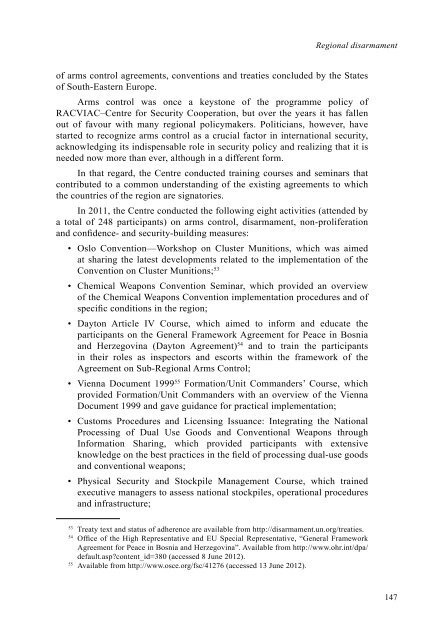DYB2011-Part-II-web
DYB2011-Part-II-web
DYB2011-Part-II-web
You also want an ePaper? Increase the reach of your titles
YUMPU automatically turns print PDFs into web optimized ePapers that Google loves.
Regional disarmament<br />
of arms control agreements, conventions and treaties concluded by the States<br />
of South-Eastern Europe.<br />
Arms control was once a keystone of the programme policy of<br />
RACVIAC–Centre for Security Cooperation, but over the years it has fallen<br />
out of favour with many regional policymakers. Politicians, however, have<br />
started to recognize arms control as a crucial factor in international security,<br />
acknowledging its indispensable role in security policy and realizing that it is<br />
needed now more than ever, although in a different form.<br />
In that regard, the Centre conducted training courses and seminars that<br />
contributed to a common understanding of the existing agreements to which<br />
the countries of the region are signatories.<br />
In 2011, the Centre conducted the following eight activities (attended by<br />
a total of 248 participants) on arms control, disarmament, non-proliferation<br />
and confidence- and security-building measures:<br />
• Oslo Convention—Workshop on Cluster Munitions, which was aimed<br />
at sharing the latest developments related to the implementation of the<br />
Convention on Cluster Munitions; 53<br />
• Chemical Weapons Convention Seminar, which provided an overview<br />
of the Chemical Weapons Convention implementation procedures and of<br />
specific conditions in the region;<br />
• Dayton Article IV Course, which aimed to inform and educate the<br />
participants on the General Framework Agreement for Peace in Bosnia<br />
and Herzegovina (Dayton Agreement) 54 and to train the participants<br />
in their roles as inspectors and escorts within the framework of the<br />
Agreement on Sub-Regional Arms Control;<br />
• Vienna Document 199955 Formation/Unit Commanders’ Course, which<br />
provided Formation/Unit Commanders with an overview of the Vienna<br />
Document 1999 and gave guidance for practical implementation;<br />
• Customs Procedures and Licensing Issuance: Integrating the National<br />
Processing of Dual Use Goods and Conventional Weapons through<br />
Information Sharing, which provided participants with extensive<br />
knowledge on the best practices in the field of processing dual-use goods<br />
and conventional weapons;<br />
• Physical Security and Stockpile Management Course, which trained<br />
executive managers to assess national stockpiles, operational procedures<br />
and infrastructure;<br />
53 Treaty text and status of adherence are available from http://disarmament.un.org/treaties.<br />
54 Office of the High Representative and EU Special Representative, “General Framework<br />
Agreement for Peace in Bosnia and Herzegovina”. Available from http://www.ohr.int/dpa/<br />
default.asp?content_id=380 (accessed 8 June 2012).<br />
55 Available from http://www.osce.org/fsc/41276 (accessed 13 June 2012).<br />
147


